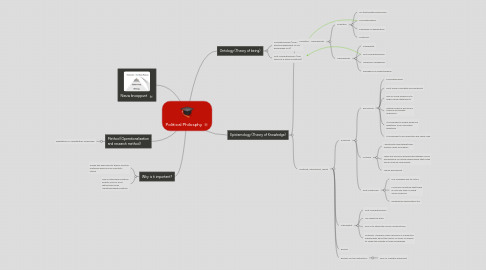
1. Why is it important?
1.1. Shape the approach to theory and the methods which social scientists utilize
1.2. One's ontological position effects, but far from determines ones epistomological position.
2. Method (Operationalisation and research method)
2.1. Kwalitatief vs. Kwantitatief onderzoek
3. Nieuw knooppunt
4. Ontology (Theory of being)
4.1. Foundationalism (The world exists independent of our knowledge of it).
4.2. Anti-foundationalism (The world as a social construct)
5. Epistemology (Theory of Knowledge)
5.1. Scientific - Hermeneutic
5.1.1. Scientific
5.1.1.1. All started with empiricism,
5.1.1.2. Foundationalism
5.1.1.3. Emphasis on explanation
5.1.1.4. Positivist
5.1.2. Hermeneutic
5.1.2.1. interpretist
5.1.2.2. Anti-foundationalism
5.1.2.3. Meaning of behaviour
5.1.2.4. Emphasis on understanding
5.2. Positivist, interpretist, realist
5.2.1. Positivist
5.2.1.1. Key points
5.2.1.1.1. Foundationalism
5.2.1.1.2. Most social scientists are positivists
5.2.1.1.3. Aim of social science is to make causal statements
5.2.1.1.4. Natural science and social science are greatly analogous
5.2.1.1.5. It is possible to shape empirical questions from normative questions
5.2.1.1.6. It is possible to be objective and value-free
5.2.1.2. Critique
5.2.1.2.1. ''Positivists misinterpret how science really proceeds''
5.2.1.2.2. There are obvious differences between social and physical or natural phenomena that make social ‘science’ impossible
5.2.1.2.3. Nieuw knooppunt
5.2.1.3. Post-positivism
5.2.1.3.1. Has changed due to critics
5.2.1.3.2. Much less assertive that there is only one way of doing social sciences
5.2.1.3.3. Emphasizes explanation still.
5.2.2. Interpretist
5.2.2.1. Anti-foundationalism
5.2.2.2. No objective truth
5.2.2.3. Role is to study the social constructions
5.2.2.4. Critisism: It merely offers opinions or subjective judgements about the world; no basis on which to judge the validity of their knowledge
5.2.3. Realist
5.2.4. Reason for the distinction
5.2.4.1. Skin vs. Sweater argument
